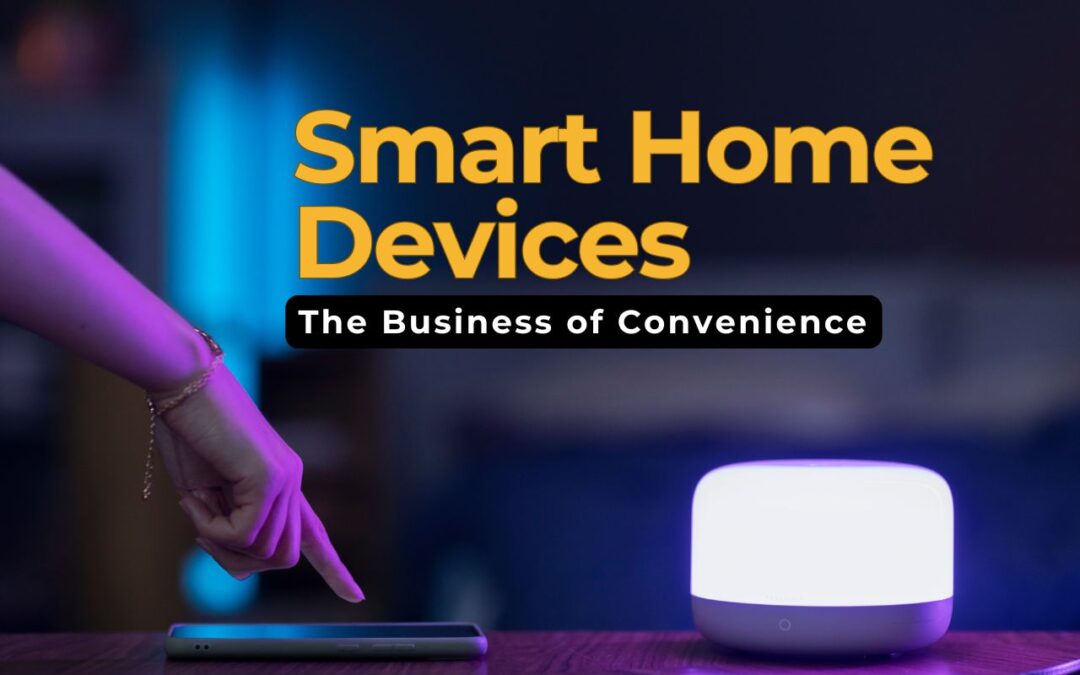In a world driven by technological advancements and rapid urbanization, the concept of home has evolved significantly. No longer is it just a shelter or a place to unwind—it has become a dynamic environment powered by intelligent systems. This transformation is largely attributed to the growing popularity of smart home devices. These devices, once a futuristic fantasy, are now central to modern living, offering unmatched convenience, efficiency, and control.
But beyond the allure of automated lights, voice-activated assistants, and energy-efficient systems lies a thriving industry. The smart home sector is not just about gadgets—it is a multifaceted business ecosystem influencing construction, real estate, software development, energy, and lifestyle industries. This blog explores the business of convenience that smart home devices have birthed, the consumer behaviors shaping their demand, and how entrepreneurs and corporations alike are leveraging this revolution.
The Rise of Smart Homes: Why Convenience Matters
Convenience has become a currency in today’s fast-paced world. People are no longer satisfied with basic functionality; they want comfort, control, and customization at their fingertips. This shift in mindset is precisely what smart home technology addresses. From automating daily tasks to improving safety and energy consumption, smart devices are designed to simplify lives.
But convenience isn’t just a byproduct—it’s a primary value proposition. The demand for convenience has catalyzed the development of intelligent ecosystems where everything from lighting to entertainment to climate control can be managed through interconnected systems. As more consumers become accustomed to these luxuries, expectations continue to rise, pushing companies to innovate rapidly.
Consumer Behavior and the Drive for Automation
The modern consumer is tech-savvy, value-conscious, and sustainability-minded. These characteristics have fundamentally changed how products are designed, marketed, and sold. For instance:
- Tech Integration: People want products that integrate seamlessly with their daily routines and digital habits.
- Energy Efficiency: Environmental awareness drives demand for devices that reduce waste and utility costs.
- Security: Home safety remains a top priority, and smart security solutions offer real-time monitoring and remote access.
- Remote Control: With busy lifestyles, the ability to manage home systems from anywhere is no longer a luxury—it’s expected.
This behavioral shift has opened up new business models, from subscription-based platforms to home automation consultancy services, all centered around delivering convenience.
Building the Business Around Smart Homes
The smart home market is no longer limited to manufacturing and selling devices. It has expanded into a complex value chain involving software, hardware, data analytics, cloud services, and customer support. Businesses in this space often operate across several categories:
1. Product Development
At the core of the industry are innovative products that serve specific needs—whether it’s automation, security, health, or energy. These products are constantly evolving, with businesses investing heavily in research and development to stay ahead.
2. Integration Services
As the number of devices in a home increases, so does the need for seamless integration. Companies that offer setup, maintenance, and synchronization services are finding increasing demand from both individual homeowners and large housing developers.
3. Data and Analytics
Smart devices generate massive amounts of user data. Businesses are leveraging this data to personalize experiences, predict maintenance needs, and optimize energy usage. This opens opportunities for data-driven marketing, product refinement, and customer engagement.
4. Software Platforms
Behind every smart home device is a sophisticated software system. Developers build operating platforms that allow users to control their devices, monitor performance, and receive updates. These platforms are becoming the backbone of the entire ecosystem.
5. Support and Aftercare
Customer service is crucial in maintaining trust and satisfaction. Businesses that prioritize easy-to-access support channels, remote diagnostics, and regular updates are more likely to retain long-term users.
Opportunities for Entrepreneurs
The smart home industry is fertile ground for innovation. Entrepreneurs who can identify gaps in convenience, connectivity, or personalization are well-positioned to succeed. Some promising opportunities include:
- Niche Devices: Creating smart solutions tailored for pets, elderly care, or specific disabilities.
- Installation Services: Offering professional installation for customers uncomfortable with DIY setups.
- Custom Automation Plans: Designing personalized smart home ecosystems based on user behavior and preferences.
- Educational Platforms: Helping consumers understand how to use and benefit from their smart devices effectively.
- Security Auditing: With the rise of connected devices, cybersecurity becomes a concern. Entrepreneurs can offer services that audit and secure home networks.
Challenges Facing the Smart Home Business
Despite the clear benefits, the smart home industry also faces several challenges:
1. Interoperability Issues
Many smart devices operate on different protocols, making integration a headache for users. The lack of standardized systems often leads to compatibility problems, frustrating consumers and affecting adoption rates.
2. Data Privacy Concerns
As homes become more connected, the risk of data breaches grows. Businesses must navigate the fine line between personalization and privacy, ensuring that user data is secure and used ethically.
3. Cost Barriers
Although prices have become more competitive, initial investment costs for a full smart home setup can still be high. This poses a challenge, particularly in markets where income levels are moderate.
4. Technology Fatigue
While some users embrace every new gadget, others may feel overwhelmed by the pace of change. Businesses must find ways to make their offerings intuitive, non-intrusive, and genuinely beneficial.
How Real Estate and Construction Are Adapting
The ripple effect of smart home devices is particularly evident in real estate and construction. New housing projects increasingly come with built-in smart systems, making them more attractive to buyers. Features like remote-controlled blinds, smart lighting, and integrated security systems are becoming standard in premium offerings.
Construction companies are also partnering with smart technology firms to offer “move-in ready” smart homes. This collaborative approach benefits both industries and provides consumers with a more cohesive experience.
The Role of Sustainability in Smart Living
Smart homes aren’t just about luxury—they also promote sustainable living. Intelligent thermostats, automated lighting, and water-saving devices all contribute to reducing the ecological footprint of households. As climate change continues to dominate global discourse, smart home businesses that prioritize sustainability are more likely to resonate with environmentally conscious consumers.
Furthermore, governments and regulatory bodies in various parts of the world are encouraging energy-efficient home technologies through incentives and policy support. This creates a favorable environment for businesses looking to invest in sustainable smart solutions.
Future Trends: Where the Smart Home Business Is Heading
As technology continues to evolve, so will the smart home industry. Key future trends likely to shape the business include:
- AI and Predictive Automation: Homes that learn from user behavior and anticipate needs without manual input.
- Voice and Gesture Control: A move toward more natural user interfaces that reduce dependency on screens and apps.
- Integration with Health Tech: Smart homes monitor vital signs, sleep patterns, and other health indicators.
- Rural and Low-Cost Market Expansion: Efforts to bring smart technology to underserved areas at affordable costs.
- Blockchain for Security: Enhancing device communication and privacy using decentralized networks.
Businesses that remain agile and innovative will thrive in this evolving landscape.
Conclusion
The business of smart home devices is a story of transformation—of homes, habits, and industries. At its core lies the promise of convenience, and as long as people seek comfort, control, and simplicity, this sector will continue to grow. It’s not merely about adding gadgets to homes—it’s about creating intelligent environments that enhance the quality of life.
For entrepreneurs, tech developers, service providers, and investors, this is a golden era of opportunity. By aligning with user expectations, ensuring privacy, and delivering real value, businesses can not only profit but also play a pivotal role in shaping the future of modern living.
The smart home isn’t a passing trend. It’s a paradigm shift—and those who understand the business of convenience are poised to lead it.
FAQs
Q: What makes a home “smart”?
A smart home is equipped with interconnected devices that can be controlled remotely or automatically to manage functions like lighting, temperature, security, and entertainment.
Q: Is the investment in smart home devices worth it for businesses?
Yes, the growing consumer demand, coupled with the ability to diversify offerings and create long-term service relationships, makes it a promising sector for businesses.
Q: Are there risks in running a smart home business?
Like any tech-driven industry, risks include data security, rapid obsolescence, and high competition. However, these can be mitigated with innovation, user-centric design, and strong support systems.
Q: Can small businesses compete with large corporations in this field?
Absolutely. Many consumers prefer localized services, niche solutions, and personalized experiences—areas where small businesses can outshine larger players.
Q: What skills are needed to start a smart home business?
A background in IT, electronics, or home automation helps, but more importantly, understanding user needs, delivering excellent support, and staying informed on tech trends are crucial.













